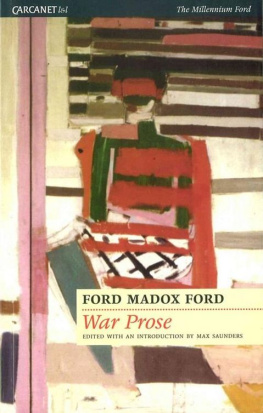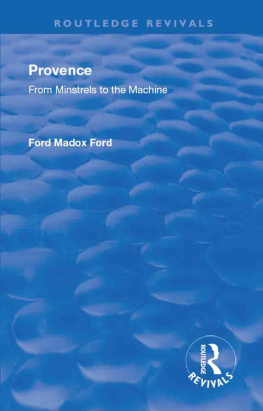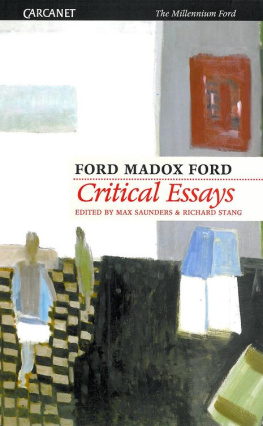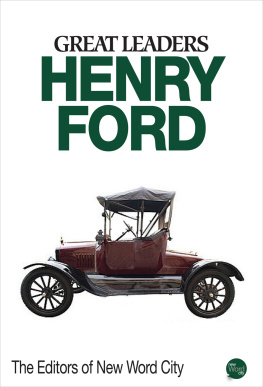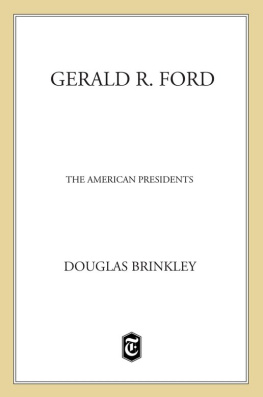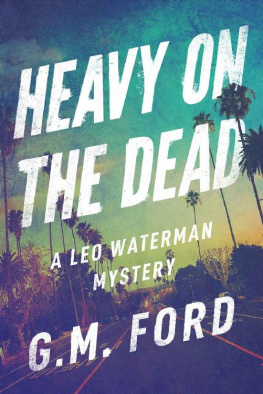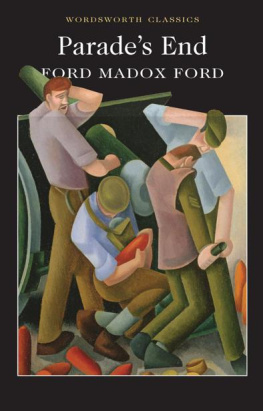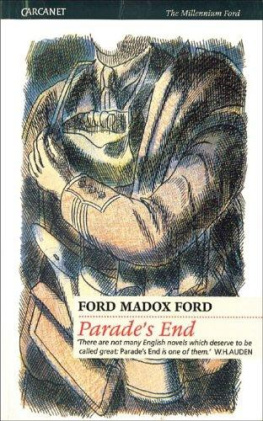Ford Ford Madox - Good Soldier
Here you can read online Ford Ford Madox - Good Soldier full text of the book (entire story) in english for free. Download pdf and epub, get meaning, cover and reviews about this ebook. City: UK, year: 1999, publisher: Oxford University Press, genre: Art. Description of the work, (preface) as well as reviews are available. Best literature library LitArk.com created for fans of good reading and offers a wide selection of genres:
Romance novel
Science fiction
Adventure
Detective
Science
History
Home and family
Prose
Art
Politics
Computer
Non-fiction
Religion
Business
Children
Humor
Choose a favorite category and find really read worthwhile books. Enjoy immersion in the world of imagination, feel the emotions of the characters or learn something new for yourself, make an fascinating discovery.

- Book:Good Soldier
- Author:
- Publisher:Oxford University Press
- Genre:
- Year:1999
- City:UK
- Rating:5 / 5
- Favourites:Add to favourites
- Your mark:
- 100
- 1
- 2
- 3
- 4
- 5
Good Soldier: summary, description and annotation
We offer to read an annotation, description, summary or preface (depends on what the author of the book "Good Soldier" wrote himself). If you haven't found the necessary information about the book — write in the comments, we will try to find it.
Good Soldier — read online for free the complete book (whole text) full work
Below is the text of the book, divided by pages. System saving the place of the last page read, allows you to conveniently read the book "Good Soldier" online for free, without having to search again every time where you left off. Put a bookmark, and you can go to the page where you finished reading at any time.
Font size:
Interval:
Bookmark:
OXFORD WORLDS CLASSICS
FORD MADOX FORD was born Ford Hermann Hueffer in London in 1873. His father, Dr Francis Hueffer, was an immigrant German writer, and music critic of The Times, and his maternal grandfather was the Pre-Raphaelite painter Ford Madox Brown. Born and bred an artist, Ford published his first book at the age of 17, under the name Ford Madox Hueffer. In 1919, after serving three and a half years in the British Army during the Great War, Ford dropped out of the London literary scene and changed his name to Ford Madox Ford; soon he moved to his beloved France. In all he produced some eighty volumes of fiction, poetry, reminiscence, biography, history, essays, travel writing, and literary and art criticism, and over four hundred magazine articles. He was the intimate friend and collaborator of Joseph Conrad, and knew well such contemporaries as H. G. Wells, D. H. Lawrence, Ezra Pound, James Joyce, and the American poet William Carlos Williams. He was founder and editor of both the English Review and the Transatlantic Review, but his greatest achievement lay in the novel, particularly in his undisputed modern masterpieces, The Good Soldier (1915) and the Tietjens tetralogy Parades End (19248).
Ford early married Elsie Martindale and had by her two daughters. Never divorced, he subsequently had lengthy liaisons with three other women who all took his name: the novelist Violet Hunt, and the artists Stella Bowen (by whom he had a daughter) and Janice Biala. Ford died in Beauville, France, in 1939.
THOMAS C. MOSER is Professor of English Emeritus at Stanford University. He is the author of Joseph Conrad: Achievement and Decline (1957) and The Life in the Fiction of Ford Madox Ford (1981). He is also the editor of Wuthering Heights: Text, Sources, Criticism (1962) and the Norton Critical Edition of Lord Jim (1968; second edition 1996). He has published numerous articles, including most recently a psychobiographical study of William Faulkner in a Festschrift for Ian Watt.
OXFORD WORLDS CLASSICS
Forover 100 years Oxford Worlds Classics have brought readers closer to the worlds great literature. Now with over 700 titlesfrom the 4,000-year-old myths of Mesopotamia to the twentieth centurys greatest novelsthe series makes available lesser-known as well as celebrated writing.
The pocket-sized hardbacks of the early years contained introductions by Virginia Woolf, T. S. Eliot, Graham Greene, and other literary figures which enriched the experience of reading. Today the series is recognized for its fine scholarship and reliability in texts that span world literature, drama and poetry, religion, philosophy and politics. Each edition includes perceptive commentary and essential background information to meet the changing needs of readers.
Refer to the to navigate through the material in this Oxford Worlds Classics ebook. Use the asterisks (*) throughout the text to access the hyperlinked Explanatory Notes.
OXFORD WORLDS CLASSICS

FORD MADOX FORD
A Tale of Passion

Edited with an Introduction and Notes by
THOMAS C. MOSER


Great Clarendon Street, Oxford ox2 6DP
Oxford University Press is a department of the University of Oxford.
It furthers the Universitys objective of excellence in research, scholarship,
and education by publishing worldwide in
Oxford New York
Athens Auckland Bangkok Bogot Buenos Aires Cape Town
Chennai Dar es Salaam Delhi Florence Hong Kong Istanbul Karachi
Kolkata Kuala Lumpur Madrid Melbourne Mexico City Mumbai Nairobi
Paris So Paulo Shanghai Singapore Taipei Tokyo Toronto Warsaw
with associated companies in Berlin Ibadan
Oxford is a registered trade mark of Oxford University Press
in the UK and in certain other countries
Published in the United States
by Oxford University Press Inc., New York
Introduction, Note on the Text, Select Bibliography,
Chronology, and Explanatory Notes Thomas C. Moser 1990
The moral rights of the author have been asserted
Database right Oxford University Press (maker)
First published as a Worlds Classics paperback 1990
Reissued as an Oxford Worlds Classics paperback 1999
All rights reserved. No part of this publication may be reproduced, stored in a retrieval system, or transmitted, in any form or by any means, without the prior permission in writing of Oxford University Press, or as expressly permitted by law, or under terms agreed with the appropriate reprographics rights organizations. Enquiries concerning reproduction outside the scope of the above should be sent to the Rights Department, Oxford University Press, at the address above
You must not circulate this book in any other binding or cover
and you must impose this same condition on any acquirer
British Library Cataloguing in Publication Data
Data available
Library of Congress Cataloging in Publication Data
Ford, Ford Madox, 18731939.
The good soldier: a tale of passion
Ford Madox Ford: edited with an
introduction by Thomas C. Moser.
p. cm.(Oxford worlds classics)
Includes bibliographical references.
I. Moser, Thomas C. II. Title. III. Series.
PR6011.053G5 1990 823.912dc20 8922810
ISBN 019283620X
5 7 9 10 8 6 4
Printed in Great Britain by
Cox & Wyman Ltd.
Reading, Berkshire
MANY people helped with this edition. In the matter of printed texts and manuscripts, I wish to thank William McPheron and Michael Ryan of Stanford University Library and James Tyler of Cornell University Library. Again at Stanford, I am grateful, for advice and support, to Albert and Barbara Gelpi, Albert and Maclin Guerard, Meg Minto, and Ruth and Ian Watt. I am also indebted, for useful information, to Maryann De Julio, C. Ruth Sabol, Todd Bender, and Joseph Wiesenfarth.
Special thanks are due to the following: George Brown, for his invaluable help with Latin passages; Mia Manzulli, for her Voluntary and arduous work on collating texts and doing the initial research for the Notes; Judith Luna, of the Oxford University Press, for her wise and precise counsel on the whole project. My greatest debt is to my wife, Joyce Penn Moser, who not only did much of the final annotation but was also deeply involved in every aspect of this edition.
MORE than a half-century after Fords death and three-quarters of a century after the books publication, The Good Soldier remains the most elusive of modern impressionist masterpieces. Indeed, it is more controversial than such notoriously problematic novels as Conrads Lord Jim, Jamess The Ambassadors, Woolfs The Waves, and Faulkners Absalom, Absalom! Even its most ardent admirers disagree strongly about basic questions: the subject (idealism, passion, knowledge?), the narrative voice (honest, deluded, dishonest?), the protagonists character (good soldier, knave, fool?). Graham Greene, a lifelong advocate of The Good Soldier, suggests that the source of the novels mysterious power may lie in Fords biography: A novelist is not a vegetable absorbing nourishment mechanically from soil and air: material is not easily or painlessly gained, and one cannot help wondering what agonies of frustration and error lay behind
Next pageFont size:
Interval:
Bookmark:
Similar books «Good Soldier»
Look at similar books to Good Soldier. We have selected literature similar in name and meaning in the hope of providing readers with more options to find new, interesting, not yet read works.
Discussion, reviews of the book Good Soldier and just readers' own opinions. Leave your comments, write what you think about the work, its meaning or the main characters. Specify what exactly you liked and what you didn't like, and why you think so.

